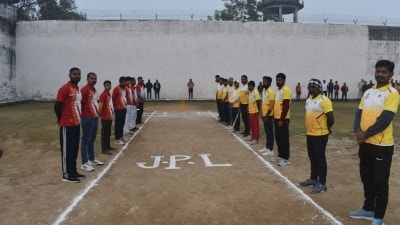Laughter on the edge
Frankly speaking, when you see Meera Nair's new film, The Laughter Club of India, you want to cry at the spur of the moment. Not that cryi...

Frankly speaking, when you see Meera Nair8217;s new film, The Laughter Club of India, you want to cry at the spur of the moment. Not that crying is the obverse side of laughter. Not because it is a bad film either. On the contrary, it is a lucid, nice film that communicates in a plain and straightforward language. Most importantly, it is a spontaneous film.
And yet I couldn8217;t digest the film. Don8217;t blame it on Meera Nair or on my inability to laugh while all those watching the film were in splits of laughter. The culprit is elsewhere. He is none other than Milan Kundera.
I entered the tiny auditorium where Meera Nair8217;s family members and friends had gathered to attend the very special screening of the film with Milan Kundera on the back of my mind. Quite naturally, you cannot go to watch a film on laughter without recalling Kundera8217;s The Book of Laughter and Forgetting. At the end of the film, I blamed Kundera for denying me the rare opportunity to laugh to my heart8217;s content.
Forked humour is the new critique. Rather than making us laugh, humour sinks its teeth into our flesh. We resort to humour to dissect ideologies or to demystify the rulers of the hinterland of fascism and authoritarianism Joseph Stalin, Chairman Mao and the like. In this context, I remember a revealing experience I had at a reception hosted in Beijing. Some of the Chinese litterateurs gathered there laughed heartily while describing how the Chinese intellectuals were subjected to extreme misery and suffering at the hands of good old Mao during his Cultural Revolution. They did not describe it with tears. Kundera taught us the art of laughing on the face of tragedies that otherwise would have provoked tears.
When Kundera recounts the case of a communist leader who is thoroughly erased from history that nothing is left of him but his hat, it is a tragedy turned into black humour. For Kundera, when Lithuania once a strong nation central to the destiny of Europe was reduced to a nonentity by the Russians, it was a matter of laughter. The post-modernists never cried over the disappearance of the Soviet Union which resulted in the remapping of the world, but rather they laughed. The sound of laughter is finding favour with our times at the expense of the salt of tears.
Coming back to Meera Nair8217;s film, it centres around a group of people who are members of the Laughter Club of India. In their opinion, we Indians do not laugh enough and that is the cause of many a problem we face at present. They seem to believe that laughter is the nostrum for most of the maladies of our times. So laugh in cascades and torrents and get yourself rid of your personal and societal illness. To prove this point, the story of a young physically and mentally handicapped man is narrated in the film. With regular laughter, he showed remarkable progress to the point that he could soon move around all by himself. An old Marathi woman, engaged at seven and married at 13, casts away all her blues by laughing.
But who says we Indians do not laugh enough? Just look around in the buses, parks and homes of our cities and you will be convinced that we talk too much, we laugh a great deal, we cry copiously. We are a people beset with excesses in everything.
If laughter is the solution for all our unresolved problems, then let us form more and more Laughter Clubs of India in order to bring about the revolution that the communists failed to materialise and to find a remedy for all our economic maladies that neither Manmohan Sihngh nor Jaswant Singh could cure. And of course to find a remedy for the maladies of identity that Jhumpa Lahiri could not cure in spite of having won the Pulitzer Prize for Literature.
Anyone with common sense knows that to laugh for the sake of laughing is not laughter at all. Just an exercise of the facial muscles won8217;t do. Laughter should come from within.
The film that began with a crowded street in Bombay closes with the elderly woman laughing loudly, standing alone in a desolate terrace. In my imagination, in the end the woman8217;s laughter turned into a piercing cry.But it was not to be.
- 01
- 02
- 03
- 04
- 05































